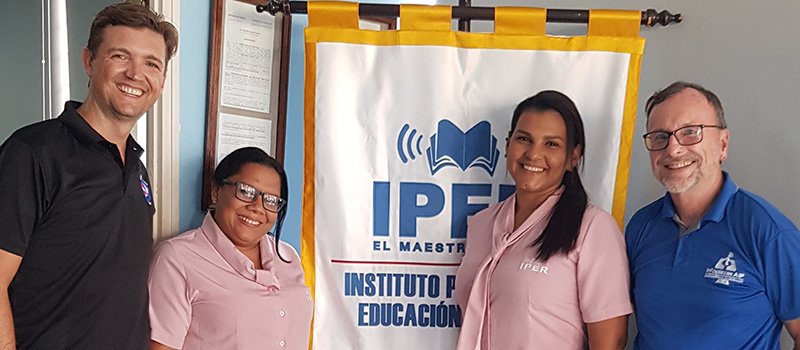Global citizen stays connected to Grinnell through volunteer roles
November 07, 2020 — Studying abroad in Kenya as a Grinnell College student lit a fire to travel and explore the world for Mansir Petrie ’99.
For the past two decades, Petrie’s work in international development has taken him to Bhutan, Bolivia, Brazil, China, Costa Rica, Kenya, Mozambique, Russia, and most recently, Panama. No matter how far away he was from Grinnell, Petrie remained attached to his alma mater.
“It’s hard to imagine anything about my life without Grinnell,” Petrie says. “I chose to attend Grinnell because of the social justice element and the lack of inter-personal competition. Grinnell was more about collaborating and forging community together than at other schools.”
When Petrie was approached last year by class fund director Matt Horstman ’99 about joining Graham Gelling ’99 as a class agent, Petrie eagerly accepted. Petrie and Gelling crafted a class letter during the early stages of the pandemic that combined classmate updates with ideas for future Grinnell encounters as well as quarantine media recommendations (The TV shows Scrubs led off the list).
 Mansir Petrie ’99, left, stands with educators in a school project the Peace Corps was involved with in Panama.
Mansir Petrie ’99, left, stands with educators in a school project the Peace Corps was involved with in Panama.
It was a communication that emphasized we are all in this together,” Petrie says. “We want to have a sense of community. With our busy adult lives and now COVID, I know our class is not at the same level of communication as we used to be, but the letter is something to join us together.”
An anthropology and environmental studies student at Grinnell, Petrie received environmental grants from Grinnell to study in Kenya and Costa Rica. He then was selected as the Grinnell-in-Nanjing Fellow for 1999-00. He taught English and studied Chinese at Nanjing University, Grinnell’s partner university in China.
“I’m so amazed at all the opportunities provided to Grinnell students,” Petrie says. “Grinnell throws opportunities at you, if you are just willing to go for it. I learned to take advantage of any global opportunity presented. It made me more of a global citizen and allowed me to blend environmental, cultural, and anthropological studies.”
Petrie returned to the College to give a talk after the Nanjing Fellowship and was invited back as an alumni scholar in 2005 to discuss his early career experience with students. He has stayed in touch with anthropology Professor Jon Andelson ’70 over the years, and biology Professor David Campbell is a good friend. Petrie also has applied to host student externships and has offered to take on mentoring roles in future initiatives with the Institute for Global Engagement (IGE).
Over the years, Petrie has worked as senior program associate for the World Foundation for Environment and Development, was a Zambezi River emergency flood photojournalist and field agent in Mozambique, and served as executive director of the Instituto Exclusivo language institute in Bolivia. He is wrapping up a job as Peace Corps Response program manager in Panama. In this role, he worked with 10-15 volunteers on topics ranging from rural agriculture and HIV/AIDS prevention to government cyber cafes and community development initiatives.
“After living in Bolivia, Panama represented a shift toward the more familiar,” Petrie says. “Panama is influenced by the U.S. economically and politically. It was a good experience. I thought I was immune to complaining about the heat, but the level of humidity was incredible. My wife’s from Brazil, so I felt like I knew humidity, but Panama is a whole other level.”
With the pandemic preventing Peace Corps volunteer travel to Panama, Petrie moved to North Carolina in July and is now transitioning out of the job.
“I’ve been doing international development for such a long time, so I’m hoping to continue it,” he says. “The Research Triangle is a great place for international development and international cooperative work. For now, I have a long list of things that I have not been able to do living abroad for so long. With my wife and daughter, we’re thinking about how we bring our beliefs in the values of multiculturalism and diversity to what’s next.”
Petrie also is thinking about other ways to keep the class of 1999 connected until they can gather in person after the pandemic.
“I do really value and appreciate our shared visions,” he says. “We can be a support group for each other to motivate, stay in touch, and enjoy life together.”
—by Jeremy Shapiro
For your information:
Learn more about the roles of class agents. To inquire about being a class agent, contact Jessica Stewart, senior associate director of alumni and donor relations, at stewarje@grinnell.edu.
To read more alumni news, check out our news archive.